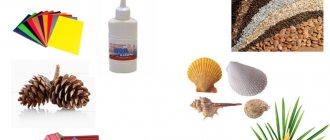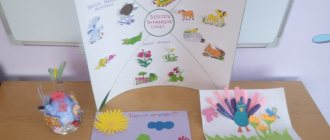Preparatory group. Senior preschool age. Children 6-7 years old
Summary of the open lesson “Our home is the Southern Urals” in a group of senior preschool age Goal: Systematize and generalize children’s knowledge about the Southern Urals as their native land. To foster feelings of patriotism and respect for one’s homeland. Cultivate an emotional positive attitude towards the places where the child was born and lives: his native land, village. Equipment:…
Open lesson by a psychologist with primary school and senior preschool age students “Emotions, feelings, moods”
Open sessions of a psychologist in the social sphere with primary school and senior preschool age children. Topic: “Emotions, feelings, moods”
. Goal: introducing children to basic emotions. Objectives: Improving understanding of oneself and others Development of attention and thinking Development of the emotional sphere….
The year before school: where to start?
And now the most important moment comes in the life of our preschooler - he is 6 years old, the last year before school. The child doesn’t care, he continues to frolic and enjoy life, but the parents are in terrible anxiety. He's going to school soon, but he also confuses the letters, and can say "three" for "one plus one", and, most importantly, he doesn't want to do anything at all, but just drives and drives his cars or watches cartoons. And he doesn’t listen about Carlson and Nils, and even for the necessary and useful program “In the World of Animals” he can’t be seated... But the neighbor’s boy already reads the fairy tales of the Brothers Grimm himself, and in a good English school across the road, during the entrance test you have to write a dictation...
What can be done to avoid this harsh stage for parents of a hyperdynamic child with the least losses and the greatest efficiency?
First of all, you need to define goals and objectives. What is important here is not only the content of the goals, but also the order in which they are arranged. Pay attention to this.
Here they are:
- Do not allow the child to develop a persistent aversion to the process of schooling even before the start of education.
- Find out what specific weaknesses there are in the child’s cognitive processes (auditory memory, logical thinking, imaginative thinking, brain-hand connection, etc.)
- Prepare your child for school and first grade.
- To form in the child a positive self-esteem and a positive attitude towards future learning.
How can all this be done?
To begin with, it is completely unacceptable to send a hyperdynamic child to school if he is not yet 7 years old at the time of admission. A child can be as intellectually developed as he likes, but psychophysically he is not yet ready for the school situation. Not right away, but it will definitely manifest itself. And then in the third or fourth quarter of first grade or at the beginning of second grade it will be too late to correct anything.
Sometimes parents say that a 6-year-old child is completely ready for school (reads, counts, writes), and for another year in kindergarten he will simply be bored. Calm down! A hyperdynamic child is never bored. He loves to play and just move. If it seems to you that he lacks educational experiences, send him to one or two “interest” clubs this year. There will be a lot of benefit and no harm. And the next year, having become physically and mentally stronger, the child will calmly and happily go to school. Of course, there are no rules without exceptions, and “Filippies” are occasionally found among hyperdynamic children, but each such case requires individual consideration and detailed consultation with a specialist.
How to choose a school and teacher?
This can be done in different ways. I’ll take the liberty of offering one of the most uncommon, but very effective.
You go to the school(s) where you plan to send your child and watch the fourth graders come out into the lobby after school ends. Among the children who ran out, you notice three or four disheveled, agile as mercury, with an open briefcase and hands smeared with ink. If at the same time they scream like crazy and speak, choking and dancing on the spot, then you can be sure that this is the hyperdynamic contingent of this class. Next, you notice which of the children you are interested in meet. Approach your mother or grandmother and say something like the following:
- Hello! Excuse me, please, my son is entering first grade next year. Perhaps it will end up with your teacher. In some ways he resembles your boy (girl). I'm very worried about him. Tell me, how did your relationship with the teacher develop these three years?
The following are possible options. If you are told a tragic story about the struggle for academic performance, notebooks and diaries dotted with red, standing in corners and scolding at parent-teacher meetings, then, regardless of the “official” reputation of this teacher, you should seriously think about it before giving your hyperdynamic child to her class.
If they tell you that there were a lot of problems, but the teacher somehow managed to find an approach to the child, always found something to praise him for, and as a result, he now makes fewer mistakes, and has become more attentive to his studies, and I always enjoy going to school—you can rest assured that this is exactly what you need.
Short stay group (STG)
As a rule, very young children from 1 to 3 years old are enrolled in the short-stay group. This service can be used by any interested parent who has submitted the necessary documents and joined the queue. Such groups work 3 times a week for 3 hours in total.
Classes there start at 8:30 and last until 11:30. There is also an evening shift from 16:00 to 19:00. It all depends on the schedule of classes at the educational institution, so always check the opening hours at your garden.
Note to parents
Most often, parents worry about at what age to send their child to kindergarten and whether it is worth doing it so early, because children from 1 to 3 years old still need their mother’s presence. It is especially difficult for parents to make a decision if this is the first baby in the family.
Staying in kindergarten is the very first and most important experience for every child. Here he learns to show his personal qualities and communicate with peers.
If we omit the details, the opinion of many experts agree on one thing: from a psychological point of view, meeting and communicating with children in a playful and relaxed manner helps the child adapt and enter society. After all, in this society the child will grow and develop, gain experience and experience different stages of personality development. And the sooner the child begins to adapt, the better it will be for his psychological health.
It should be noted that young mothers and fathers should also be prepared for such a responsible step.
And before you send your child to a short-stay group, make sure that this is exactly the place where your son or daughter will be comfortable.
Today you can quickly find reviews on the Internet about any product or service. Look for reviews and comments about your kindergarten. And you probably know mothers whose children also go to this kindergarten. You can also come to the kindergarten and see everything with your own eyes, and chat with the nannies and teachers.
What activities are conducted with children in short-stay groups?
Typically, such groups have 2 classes a week of physical education and music and once a week classes in drawing, modeling, literature and design.
It’s also not difficult to sign up for GKP groups. They are available in almost all preschool institutions. To be included in the group, you must:
- contact the head of the kindergarten with a request to enroll the child in the GKP. If there are places in the group, you will definitely be accepted;
- if there are no free places, contact the so-called “Mini-OSIP” (this is the district information support service).
- You can also sign up for the group through the city services portal
When you have found a place, you need to worry about documents for the garden. There are not many of them, but you will have to collect them quickly:
- passport of the parent or legal representative of the child;
- baby's birth certificate;
- child registration in the city;
- if you have benefits, also provide a document for inclusion in the preferential category;
Enrollment in the GKP occurs in the same way as in a regular kindergarten group. You are put on a waiting list and when a place becomes available, they call you and inform you that your child can go to kindergarten.
Procedure for enrollment in a short-stay group.
When there are few free places in a group, the head of the kindergarten must follow certain rules when enrolling a child in the group. For example, your child will be accepted faster if:
- your family (or child) lives/is registered in this area;
- preferential categories of children
If all children from this list are enrolled, then in order of priority the following are enrolled:
- children with temporary registration
- kids from other areas
A parent does not have to go to the daycare every week or month to find out if a place has become available. Typically, parents are sent an email notification or receive a call on their cell phone.
When enrolling in kindergarten, check the availability of a medical card, and immediately before enrollment you must provide:
- contacts of the child and his parents;
- complete blood count and urine test;
- analysis for enterobiasis and worm eggs
Before enrolling a child in a kindergarten group, the parent will have to sign a service agreement, which will spell out all the rights and responsibilities of both parents and teachers.
As a rule, documents of this kind protect both parties from possible claims. Therefore, every parent should not be lazy and read this agreement carefully.
Features of children staying in a short-term group
The child is not in kindergarten all day, but only for some part of the day, so meals are not provided here. But any baby can freely ask for water. So before you send your son or daughter to kindergarten, don't forget to feed him.
Adaptation in the group is quite smooth. Any parent can go to the group and see how their child feels there. This makes it easier for the baby to survive a long separation from his parents and get comfortable in a new environment. Remember also that the child’s psyche is quite vulnerable at this age, and any innovation can have a bad effect on his emotional state. But if you prepare your baby and send him to a short-term group, you can avoid negative emotions on the part of the baby.
The first days in the GKP last only half an hour for a child. Then the stay time becomes longer, but it all depends on the child’s behavior and addiction. Often educators recommend starting with half an hour and adding only 15 minutes every few days so as not to escalate the situation.
Approximate schedule for short-stay groups:
- Monday - 9:00-9:10 music games; 10:10-10:20 didactic games;
- Tuesday—10:00-10:10 movement development, 10:30-10:40—artistic creativity (drawing, modeling, appliqué, coloring must alternate here);
- Wednesday—9:00-9:10 didactic game, 10:00-10:10 speech development;
- Thursday—9:00-9:10 outdoor game; 10:00-10:10 games with building materials;
- Friday—9:10-9:20 educational game; 10:00-10:10 music game
The average monthly cost of GKP is about 1,500 rubles. However, if you have benefits, you can write an application for payment compensation (or part of the compensation).
What additional expenses does the parent expect?
Many kindergartens and groups also have additional expenses, which most often depend on the director of the kindergarten. This point should also be discussed in advance, and it is best to do this at the time of signing the contract with the garden. Although, the times when huge gatherings were held in gardens are long gone.
However, some parents face actual extortion. In this case, you should contact the anti-corruption hotline.






